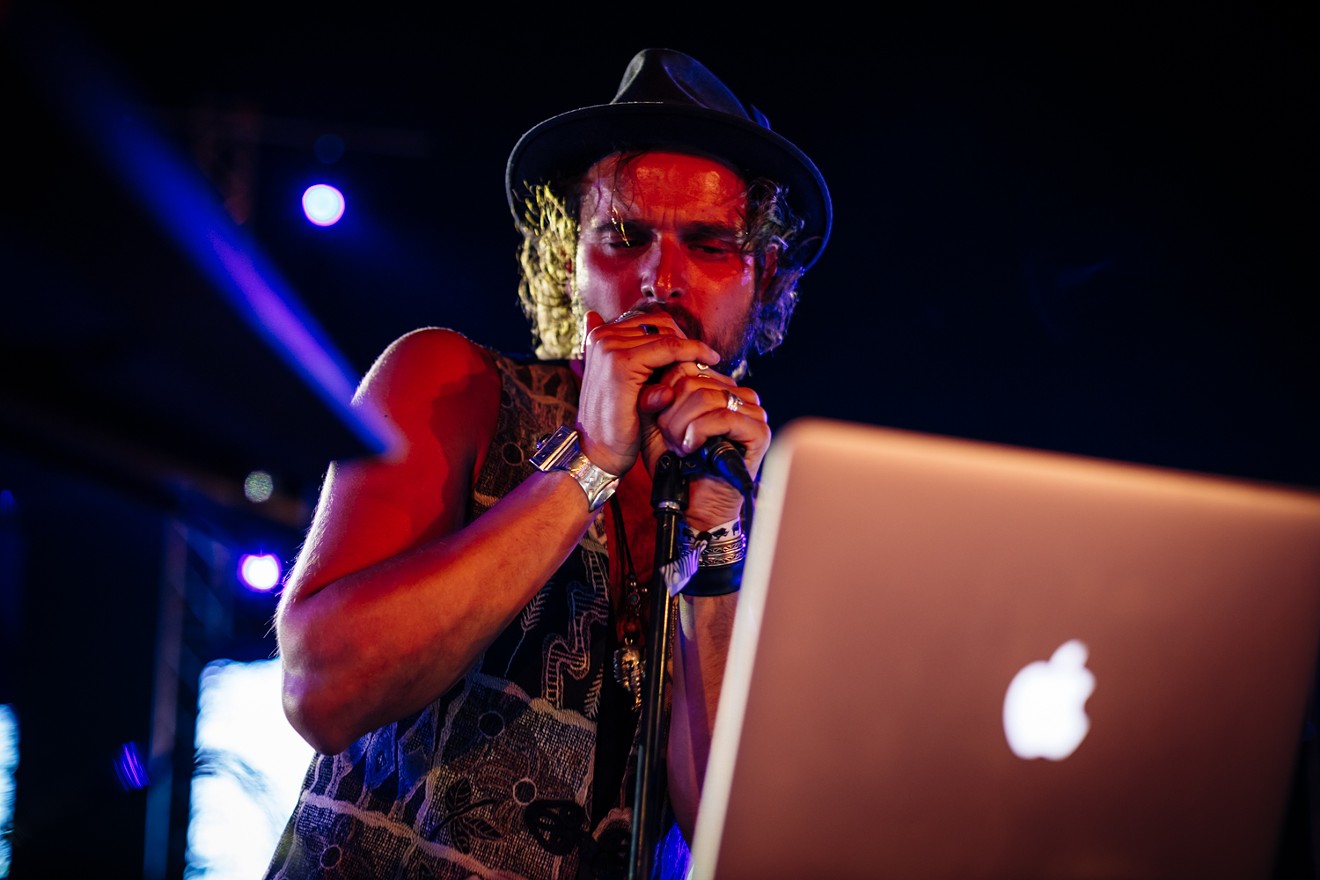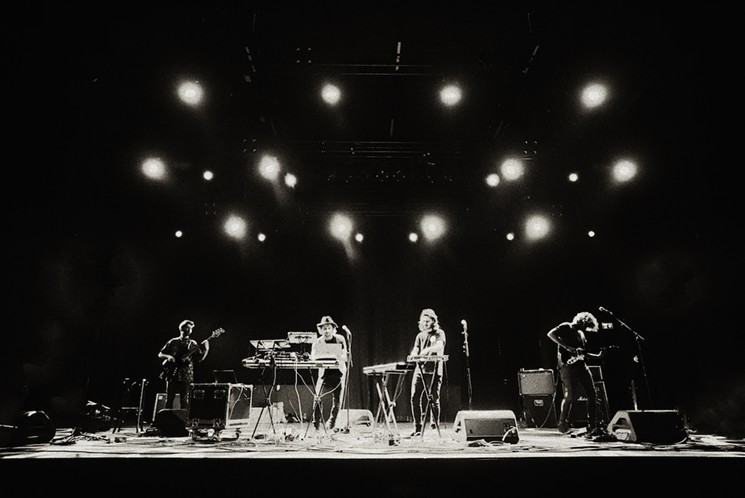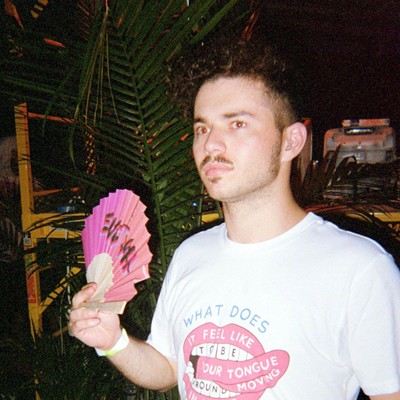Djordje Petrovic is a musician’s musician. Under his artistic moniker, Satori, the Holland-born Petrovic has built a career on sonic exploration and progression. His most recent album, last year’s Maktub (Arabic for "it is written"), saw Petrovic continue to defy easy categorization. Although he’s ostensibly a dance artist, his electronic productions incorporate instrumentation and tonalities from around the world, with nary a bass drop or lush female vocal to be heard. Instead of extolling the virtues of nights out on the town, Petrovic prefers to immerse listeners in music evocative of faraway cultures and places; if ever there were a way to get the club kids into world music, it would be through the sounds of Satori.
Touring in support of Maktub, Petrovic will be accompanied for the first time by a full backing band, the appropriately named Band From Space. They'll perform at the Ground — the first floor of Club Space — February 23 as part of a limited series of U.S. shows.
Petrovic recently spoke with New Times about the inspiration behind his new live assemblage, his previous experiences in Miami, and creating music with intention both live and in the studio.
New Times: This tour marks the first time you’re performing with the accompaniment of a full live band. Was this something you were intent on doing during the recording of Maktub?
Djordje Petrovic: It has been on my mind for a while. I’ve noticed that performing as an electronic musician onstage can still create a kind of distance from the crowd compared to when you have instruments in your hands. Unfortunately, when it comes to electronic music, most of the time you cannot see what someone is doing, and that creates distance, even detachment. With my own live set, I try to make many things feel physical. They say motion creates emotion. Still, it’s not always enough. That explains why I’ve wanted to combine the [expressive] instrumental world with the electronic world.
Can you talk about the process of rehearsing the Maktub material with a full band?
It’s so hard to achieve with an instrument played by a person what I create in my studio. In the beginning — and for quite a while — each time we tried to achieve a specific musical element of my music, it ended up sounding flat and way more boring than how I play them solo. And that’s bad; in my book, there is nothing sadder that when you hear a band playing a song you like and realizing that the Spotify version is better. No, the idea is to make this come alive onstage, isn’t it?
But somewhere down the line, there came this big realization that the point should never have been to re-create the perfect live copy of each Satori track. Instead, the focus should be on re-creating the same intention and spirit each track was created with, but with the instruments we have.
Having performed in Miami previously, did you leave with any lasting thoughts of the city or what differentiates it from other metropolitan cities?
First of all, I love the Latin flavor. It makes Miami cozy and gives the place a musical holiday vibe. It’s sometimes hard to imagine that people are actually working in Miami. You get the feeling people are always chilling.
You’ve talked about the importance of intention in your work and how that separates memorable music from more forgettable compositions. In your own creative process and onstage, how do you summon your own intention?
When I am making music and I have the feeling that the song I am working on might work, I start losing interest in it. I don’t like songs that work, that have this catchy hook that works on a stage. The piece of music that I am creating needs to make me come alive. In my studio, I have a quote that explains this perfectly: "Don’t ask yourself what the crowd needs, but ask yourself what makes you come alive, because what the crowd needs is me to be alive." So if I release music that has no intention at all, only a catchy hook and a fat bass line that always works, it won’t be enough to let me come alive.
And I think in the end, we all have a sense of what songs gave their composer the most thrills and shivers, and although maybe not everyone will love it, the ones who will stand to gain a lot more out of it... will be connecting to the intention.
I am looking for a deeper connection with the crowd; I want to move them. Perhaps more importantly, I want to be moved by them. I want to inspire the people around me, and I want to be inspired by them. I see my music as a dialogue, not as a monologue. In order for a dialogue to exist, the crowd needs to give something back, so we start to communicate with one another. Salsa music has that, tango has that, Balkan music has that. All this music has this special quality, where the musicians onstage give something, and the crowd, in turn, gives something back. You inspire each other to climb to the moon.
Satori and the Band From Space. 10 p.m. Friday, February 23, at the Ground, 34 NE 11th St., Miami; 305-375-0001; thegroundmiami.com. Tickets cost $15 to $25 via tickefly.com.
[
{
"name": "Air - MediumRectangle - Inline Content - Mobile Display Size",
"component": "19274298",
"insertPoint": "2",
"requiredCountToDisplay": "2"
},{
"name": "Editor Picks",
"component": "17482312",
"insertPoint": "4",
"requiredCountToDisplay": "1"
},{
"name": "Inline Links",
"component": "18711090",
"insertPoint": "8th",
"startingPoint": 8,
"requiredCountToDisplay": "7",
"maxInsertions": 25
},{
"name": "Air - MediumRectangle - Combo - Inline Content",
"component": "17482310",
"insertPoint": "8th",
"startingPoint": 8,
"requiredCountToDisplay": "7",
"maxInsertions": 25
},{
"name": "Inline Links",
"component": "18711090",
"insertPoint": "8th",
"startingPoint": 12,
"requiredCountToDisplay": "11",
"maxInsertions": 25
},{
"name": "Air - Leaderboard Tower - Combo - Inline Content",
"component": "17482313",
"insertPoint": "8th",
"startingPoint": 12,
"requiredCountToDisplay": "11",
"maxInsertions": 25
}
]













